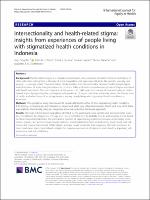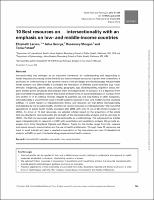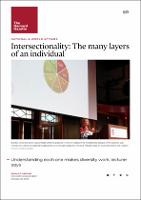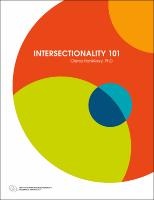1.01.05 Intersectionality
Recent Submissions
Intersectionality and health-related stigma: insights from experiences of people living with stigmatized health conditions in Indonesia
(International Journal for Equity in Health, 2020-12)
Abstract Background Health-related stigma is a complex phenomenon, the experience of which intersects with those of other adversities arising from a diversity of social inequalities and oppressive identities like gender, sexuality, and poverty – a concept called “intersectionality”. Understanding this intersectionality between health-related stigma and other forms of social marginalization can provide a fuller and more comprehensive picture of stigma associated with health conditions. The main objective ...
Group inequality and intersectionality
(E-Bulletin of the Human Development & Capability Association, 2014-07)
10 Best resources on… intersectionality with an emphasis on low- and middle-income countries
(Health Policy and Planning, 2016-10-01)
Intersectionality has emerged as an important framework for understanding and responding to health inequities by making visible the fluid and interconnected structures of power that create them. It promotes an understanding of the dynamic nature of the privileges and disadvantages that permeate health systems and affect health. It considers the interaction of different social stratifiers (e.g. ‘race’/ ethnicity, indigeneity, gender, class, sexuality, geography, age, disability/ability, migration status, religion) and the power structures that und...
Understanding each one makes diversity work, lecturer says
(the Harvard Gazette, 2022-10)
INTERSECTIONALITY 101
(Institute for Intersectionality Research and Policy)
Interest in and applications of intersectionality have grown exponentially in popularity
over the last 15 years. Scholars across the globe from a variety of disciplines, including
sociology, political science, health sciences, geography, philosophy and anthropology, as
well as in feminist studies, ethnic studies, queer studies and legal studies, have drawn on
intersectionality to challenge inequities and promote social justice. This practice has also
extended to policy makers, human rights activists and community organizers search
-
ing ...





